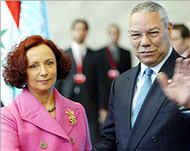UNHRC argues ‘terror effect’ on civil rights
The UN’s top human rights body opened its annual meeting with a debate on the impact of terror attacks and sweeping security powers on civil liberties set to overshadow the six-week session.

Mike Smith, the Australian envoy presiding at the UN Human Rights Commission (UNHRC) this year, opened the meeting on Monday with a reminder of recent deadly bomb attacks that hit civilians in Iraq, Spain and Israel.
“The sad truth is that there can scarcely be a country in this hall which has not been touched by terrorism in the last couple of years,” he said.
“And we need to think what we as a commission might do to protect better the rights of the victims of terrorist attacks as well as the innocents who suffer in the aftermath of terrorism,” he added.
Spain’s Foreign Minister Ana Palacio and French Prime Minister Jean-Pierre Raffarin on Monday called off scheduled keynote speeches to the commission, officials said.
Palacio had been due to address the 53-country assembly only days after 200 people were killed in multiple train bombings in the Spanish capital, Madrid.
Balancing action
But the delicate issue of balancing tough action against terror attacks with concern about an erosion of civil liberties was set to slot firmly into the commission’s debate until 23 April, alongside more traditional concerns about abuse worldwide.
 |
|
Spanish FM Ana Palacio (L) called |
“We must all be conscious that terrorism has changed the nature of our world and has affected our daily lives in ways that we would have found it hard to believe previously,” Acting High Commissioner for Human Rights, Bertrand Ramcharan, told the assembly.
Symbolically lapsing into Spanish, the UN’s top human rights official said “without a doubt terrorists are a plague on the world”.
Ramcharan urged the gathering to find ways of monitoring the impact of sweeping security measures on human rights. “Notwithstanding the events of recent days, I would ask you to reflect carefully on how the Commission might be able to sharpen its contribution to the protection of human rights in counter-terrorism strategies,” he said.
Detention
But the proposals, prompted mainly by concern over the prolonged detention of al-Qaida suspects held by the United States since 2002, have been opposed by several countries since they were first floated last year.
|
“We must all be conscious that terrorism has changed the nature of our world and has affected our daily lives in ways that we would have found it hard to believe previously” Bertrand Ramcharan, |
Britain, France and Germany were ready to support in principle a Mexican resolution in the Commission, aimed at appointing an expert to keep an eye on civil liberties and the security clampdown worldwide, diplomatic sources said.
But the resolution would require support from a majority of the 53 countries in a vote at the assembly, and was likely to be opposed by the United States, Australia, Pakistan and Saudi Arabia, according to the advocacy group Human Rights Watch (HRW).
Spain criticised
Spain was criticised for the alleged mistreatment of Basque separatist detainees in a report due to be presented to the Commission by the UN Special Rapporteur on Torture.
|
“The system of detention as it is practised allows torture or ill-treatment to occur, in particular in regard to persons detained incommunicado in connection with terrorist-related activities” |
The report – which was finalised last month, weeks before the Madrid bombings – acknowledged that torture was not systematic in Spain.
But it added: “The system of detention as it is practised allows torture or ill-treatment to occur, in particular in regard to persons detained incommunicado in connection with terrorist-related activities.”
Australia, Britain, Italy, Spain and the United States were also accused by HRW of compromising on human rights concerns in hotspots of abuse such as Uzbekistan in return for support in the fight against terror groups.
Other resolutions
Other resolutions condemning abuse were expected to include Belarus, the Democratic Republic of Congo, North Korea, Myanmar, Sudan, Turkmenistan and Zimbabwe.
The United States stepped up pressure on China over its human rights record on Friday, when a senior official hinted in Washington that a resolution targeting the country could be tabled.
Arab countries were expected to repeat their effort to seek condemnation of Israel’s grip on the occupied territories, while Amnesty International urged the Commission to maintain surveillance in Iraq and in Haiti.